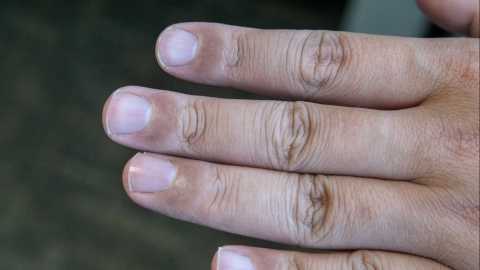What causes difficulty in bending fingers upon waking up in the morning?
Generally, difficulty bending the fingers upon waking in the morning may be caused by factors such as exposure to cold during sleep, improper sleeping posture, tenosynovitis, rheumatoid arthritis, or osteoarthritis. It is recommended to seek medical attention promptly to determine the underlying cause and receive appropriate treatment under a doctor's guidance. Specific analyses are as follows:

1. Exposure to cold at night: When fingers are exposed to cold air during sleep, blood circulation slows down, causing muscles and joints to stiffen, which leads to difficulty in bending. This can be relieved by soaking the fingers in warm water for 5–10 minutes or gently massaging them to improve blood flow and reduce stiffness.
2. Improper sleeping posture: Prolonged pressure on the arms or fingers during sleep can impair local blood circulation, resulting in difficulty bending the fingers upon waking. Adjusting sleeping posture to avoid compressing the arms and performing gentle finger and wrist movements after waking can gradually alleviate symptoms.
3. Tenosynovitis: Excessive friction between tendons and tendon sheaths due to frequent finger movement causes inflammation. Stiffness and difficulty bending are particularly noticeable in the morning and slightly improve with activity. Patients may follow medical advice to use medications such as ibuprofen sustained-release capsules, diclofenac sodium enteric-coated tablets, or celecoxib capsules to reduce inflammation. Local steroid injections into the tendon sheath may also be used to relieve symptoms.
4. Rheumatoid arthritis: An autoimmune disease that affects the joints, causing morning stiffness and difficulty bending the fingers, often accompanied by joint swelling and pain. Patients should follow medical guidance to use medications such as methotrexate tablets, leflunomide tablets, or sulfasalazine enteric-coated tablets to control disease progression and relieve symptoms.
5. Osteoarthritis: Commonly seen in middle-aged and elderly individuals, this condition involves degeneration and damage of joint cartilage. Difficulty bending the fingers occurs in the morning and improves with activity but worsens after excessive use. Patients may take glucosamine hydrochloride capsules, chondroitin sulfate tablets, or etoricoxib tablets as directed by a physician to protect cartilage and relieve pain.
In daily life, it is important to keep the hands warm, avoid prolonged repetitive hand movements, and take breaks during work or household tasks to perform finger exercises such as clenching fists and stretching. These activities help strengthen hand muscles and joints and reduce discomfort.









